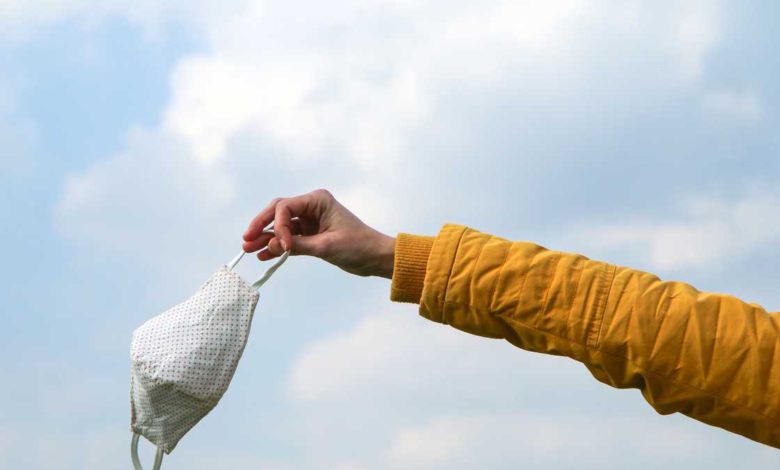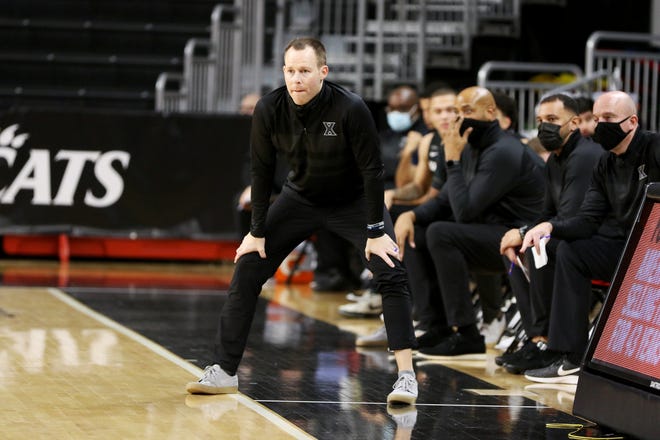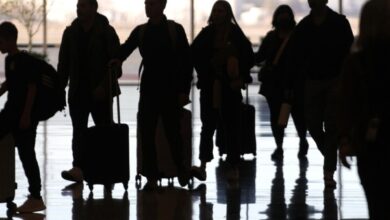
FOR EVERYONE OUTSIDE. BUT THIS CDC GUIDANCE GOES MUCH FURTHER. THE AGENCY SAYS IF YOU’RE FULLY VACCINATED, NO MASKS AND NO SOCIAL DISTANCING IS NEEDED INSIDE OR OUTSIDE IN MOST CASE >> IF YOU ARE FULLY VACCINATED, YOU CAN START DOING THE THINGS THAT YOU HAD STOPPED DOING BECAUSE OF THE PANDEMIC. MATT: -- JOSH: THE HEAD OF THE CDC CALLED THIS MOMENT EXCITING, AND POWERFUL. CITING CASES DROPPING BY A THIRD IN THE PAST TWO WEEKS, WITH DEATHS AND HOSPITALIZATIONS DECLINING STEADILY NATIONWIDE. IT’S IMPORTANT TO NOTE, THIS IS JUST GUIDANCE. RIGHT NOW, THE MASSACHUSETTS INDOOR MASK MANDATE IS STILL IN EFFECT, THE GOVERNOR TELLING US THEY’RE STILL EVALUATING THE NEW GUIDELINES. AS VACCINATIONS EXPAND TO CHILDREN, LOCAL DOCTORS SAY THE SIGNS ARE VERY GOOD RIGHT NOW. >> IT SHOULD SHOW THAT THERE IS LIGHT AT THE END OF THE TUNNEL AND VALUE FOR YOUNGER KIDS GETTING IMMUNIZED. WE ARE HEADING IN THIS DIRECTION OF GETTING BACK TO NORMAL. >> MASKS WILL STILL BE REQUIRED ON PUBLIC TRANSPORTATION SUCH AS PLANES, TRAINS, AND BUSES. THOSE WITH PRE-EXISTING CONDITIONS MAY CHOOSE TO KEEP THEM DOWN. THEY WILL FIGURE OUT HOW THIS GUIDANCE BALANCES.
3 major reasons why the CDC changed its mask guidelines for vaccinated people
Experts explain the data behind the bold decision
The Centers for Disease Control and Prevention (CDC) announced on Thursday that people who are fully vaccinated against COVID-19 no longer need to wear a face mask indoors or practice social distancing, "except where required by federal, state, local, tribal, or territorial laws, rules, and regulations, including local business and workplace guidance."The nation was shocked, to say the least. Yes, that means fully vaccinated folks can now go maskless at indoor events, inside restaurants, during exercise classes, and at worship gatherings. (Major caveat: Masks are still required on public transportation, plus in crowded, high-risk places like hospitals and homeless shelters.)"I wouldn’t go so far as to say essentially over," Anthony Fauci, M.D., director of the U.S. National Institute of Allergy and Infectious Diseases, said in an interview with CNN."I think this is a very important step in the direction of trying to get back to some degree of normality. Because this is something that everyone has had on their mind … and being able to go around without a mask indoors as well as outdoors is really a big step in that direction."However, many people feel confused by the sudden change, especially after more than a year of strict mask mandates. Understandably, there’s also concern that there’s no way to tell who, exactly, is vaccinated. Since we haven’t reached the threshold for herd immunity (only 35% of Americans are currently fully vaccinated), concerns have been raised for children under 12, who cannot yet be immunized, as well as those who are immunocompromised and rely on others to get their shot.CDC Director Rochelle Walensky, M.D., explained the reasons behind the decision during a White House COVID-19 response team briefing, and it boils down to these three factors: The COVID-19 vaccines are incredibly effective.According to phase 3 clinical trial data, the Pfizer-BioNTech vaccine is 95% effective at preventing symptomatic COVID-19, while the Moderna vaccine is about 94% effective and the single-dose Johnson & Johnson vaccine is 66% effective. Real-world data (collected from people outside of a clinical trial setting) has shown similar results. According to research published by the CDC, data from nearly 4,000 health care personnel, first responders, and other frontline workers from eight locations across the country show that both mRNA vaccines from Moderna and Pfizer are 90% effective 14 days or more after the second dose. A pre-print study published at the end of April examined the real-world effectiveness of the Johnson & Johnson vaccine in more than 1,700 people in Minnesota, Arizona, Florida, Wisconsin, and Iowa, and found that it was nearly 77% effective at preventing symptomatic illness. It’s still important to note that you can still get COVID-19 after being fully vaccinated."The vaccines, even at their best, are 95% effective," says William Schaffner, M.D., an infectious disease specialist and professor at the Vanderbilt University School of Medicine. The CDC has data on these "breakthrough infections," noting that there were 9,245 reported COVID-19 cases out of more than 95 million fully vaccinated Americans as of April 26.This is not unexpected, the CDC says, and to ensure that the data continues to be as useful as possible, the agency is "transitioning to reporting only patients with COVID-19 vaccine breakthrough infections that were hospitalized or died," as a majority of people who are vaccinated and contract the virus will have mild symptoms or none at all.Research shows the vaccines are also largely effective against coronavirus variants. Variants have gotten a lot of attention, but "the vaccines have shown good efficacy to the strains currently circulating in the U.S.," says Richard Watkins, M.D., an infectious disease physician and a professor of internal medicine at the Northeast Ohio Medical University. Data shared from Pfizer in March revealed that its vaccine was 97% effective at preventing symptomatic COVID-19, hospitalization, and deaths in people in Israel—a country where more than 80% of positive COVID-19 cases were driven by B.1.1.7, the highly infectious variant that was first detected in the U.K. In April, Pfizer also announced that its vaccine was 100% effective in preventing COVID-19 cases in South Africa, where the B.1.351 variant dominated; it also seems to be highly effective against the P.1 variant, which was first detected in Brazil, with researchers writing that the effectiveness is "roughly equivalent" to that of the vaccine against B.1.1.7. Moderna shared in January that the B.1.1.7 strain had "no significant impact" on neutralizing titers—antibodies in the blood that closely correlate with how effective a vaccine is. And despite a six-fold reduction in these infection fighters with B.1.351., the antibody levels still remained higher than what’s expected for protection against severe illness. The Johnson & Johnson was tested in clinical trials in several areas around the world when many variants were rampant. The efficacy is slightly different among the countries studied, suggesting that variants may make a difference.In the U.S., for example, efficacy of the Johnson & Johnson vaccine was 74%, while the efficacy was 66% in Brazil. In South Africa, it was 52%. Overall, the vaccine protected against severe or critical disease up to 82% of the time. The vaccines likely help prevent people from spreading COVID-19 to others.A growing body of evidence suggests that people who are fully vaccinated against COVID-19 are less likely to have a symptomatic infection and to pass SARS-CoV-2 to others should they be carrying the virus. Based the current data, "it’s unlikely that fully vaccinated people will infect others," Dr. Schaffner confirms.Preliminary data from Israel suggest that people vaccinated with the Pfizer vaccine who develop COVID-19 have a four-times lower viral load (the amount of virus they have in their body) than people who are unvaccinated, suggesting that they’re much less likely to transmit the virus. "This seems to be less of a risk than we originally thought," Dr. Schaffner says. Data is not yet available for other vaccines at this time, so the CDC will continue to monitor the research as it continues.Even with a growing amount of evidence, it’s understandable if you still prefer to wear a mask.Timothy Murphy, M.D., senior associate dean for clinical and translational research at the University at Buffalo in New York, calls the new masking guidelines a "huge, bold change," pointing out that "a lot depends on the honor system."After all, there’s no way to know if another person is vaccinated, unless you have a conversation about it. That may be easier with people you know, but not likely to happen with strangers."When you go into a crowd and there are many people not wearing masks, it’s a very safe environment if they’re all vaccinated," Dr. Murphy explains. But that level of safety does dip if there are plenty of unvaccinated people not wearing masks in the bunch, so he "understands why people might be a bit nervous" about the lifted mandate.So, if you wish to continue to wear a face mask until public health experts have presented a clearer picture of the pandemic at large, Dr. Schaffner says you should do what makes you comfortable, even if you are vaccinated.After all, research shows it protects both the wearer and the people around them — and for now, being extra cautious certainly doesn’t hurt.
The Centers for Disease Control and Prevention (CDC) announced on Thursday that people who are fully vaccinated against COVID-19 no longer need to wear a face mask indoors or practice social distancing, "except where required by federal, state, local, tribal, or territorial laws, rules, and regulations, including local business and workplace guidance."
The nation was shocked, to say the least. Yes, that means fully vaccinated folks can now go maskless at indoor events, inside restaurants, during exercise classes, and at worship gatherings. (Major caveat: Masks are still required on public transportation, plus in crowded, high-risk places like hospitals and homeless shelters.)
"I wouldn’t go so far as to say [the pandemic is] essentially over," Anthony Fauci, M.D., director of the U.S. National Institute of Allergy and Infectious Diseases, said in an interview with CNN.
"I think this is a very important step in the direction of trying to get back to some degree of normality. Because this is something that everyone has had on their mind … and being able to go around without a mask indoors as well as outdoors is really a big step in that direction."
However, many people feel confused by the sudden change, especially after more than a year of strict mask mandates. Understandably, there’s also concern that there’s no way to tell who, exactly, is vaccinated. Since we haven’t reached the threshold for herd immunity (only 35% of Americans are currently fully vaccinated), concerns have been raised for children under 12, who cannot yet be immunized, as well as those who are immunocompromised and rely on others to get their shot.
CDC Director Rochelle Walensky, M.D., explained the reasons behind the decision during a White House COVID-19 response team briefing, and it boils down to these three factors:
The COVID-19 vaccines are incredibly effective.
According to phase 3 clinical trial data, the Pfizer-BioNTech vaccine is 95% effective at preventing symptomatic COVID-19, while the Moderna vaccine is about 94% effective and the single-dose Johnson & Johnson vaccine is 66% effective.
Real-world data (collected from people outside of a clinical trial setting) has shown similar results. According to research published by the CDC, data from nearly 4,000 health care personnel, first responders, and other frontline workers from eight locations across the country show that both mRNA vaccines from Moderna and Pfizer are 90% effective 14 days or more after the second dose.
A pre-print study published at the end of April examined the real-world effectiveness of the Johnson & Johnson vaccine in more than 1,700 people in Minnesota, Arizona, Florida, Wisconsin, and Iowa, and found that it was nearly 77% effective at preventing symptomatic illness.
It’s still important to note that you can still get COVID-19 after being fully vaccinated.
"The vaccines, even at their best, are 95% effective," says William Schaffner, M.D., an infectious disease specialist and professor at the Vanderbilt University School of Medicine.
The CDC has data on these "breakthrough infections," noting that there were 9,245 reported COVID-19 cases out of more than 95 million fully vaccinated Americans as of April 26.
This is not unexpected, the CDC says, and to ensure that the data continues to be as useful as possible, the agency is "transitioning to reporting only patients with COVID-19 vaccine breakthrough infections that were hospitalized or died," as a majority of people who are vaccinated and contract the virus will have mild symptoms or none at all.
Research shows the vaccines are also largely effective against coronavirus variants.
Variants have gotten a lot of attention, but "the vaccines have shown good efficacy to the strains currently circulating in the U.S.," says Richard Watkins, M.D., an infectious disease physician and a professor of internal medicine at the Northeast Ohio Medical University.
Data shared from Pfizer in March revealed that its vaccine was 97% effective at preventing symptomatic COVID-19, hospitalization, and deaths in people in Israel—a country where more than 80% of positive COVID-19 cases were driven by B.1.1.7, the highly infectious variant that was first detected in the U.K.
In April, Pfizer also announced that its vaccine was 100% effective in preventing COVID-19 cases in South Africa, where the B.1.351 variant dominated; it also seems to be highly effective against the P.1 variant, which was first detected in Brazil, with researchers writing that the effectiveness is "roughly equivalent" to that of the vaccine against B.1.1.7.
Moderna shared in January that the B.1.1.7 strain had "no significant impact" on neutralizing titers—antibodies in the blood that closely correlate with how effective a vaccine is. And despite a six-fold reduction in these infection fighters with B.1.351., the antibody levels still remained higher than what’s expected for protection against severe illness.
The Johnson & Johnson was tested in clinical trials in several areas around the world when many variants were rampant. The efficacy is slightly different among the countries studied, suggesting that variants may make a difference.
In the U.S., for example, efficacy of the Johnson & Johnson vaccine was 74%, while the efficacy was 66% in Brazil. In South Africa, it was 52%. Overall, the vaccine protected against severe or critical disease up to 82% of the time.
The vaccines likely help prevent people from spreading COVID-19 to others.
A growing body of evidence suggests that people who are fully vaccinated against COVID-19 are less likely to have a symptomatic infection and to pass SARS-CoV-2 to others should they be carrying the virus. Based the current data, "it’s unlikely that fully vaccinated people will infect others," Dr. Schaffner confirms.
Preliminary data from Israel suggest that people vaccinated with the Pfizer vaccine who develop COVID-19 have a four-times lower viral load (the amount of virus they have in their body) than people who are unvaccinated, suggesting that they’re much less likely to transmit the virus. "This seems to be less of a risk than we originally thought," Dr. Schaffner says.
Data is not yet available for other vaccines at this time, so the CDC will continue to monitor the research as it continues.
Even with a growing amount of evidence, it’s understandable if you still prefer to wear a mask.
Timothy Murphy, M.D., senior associate dean for clinical and translational research at the University at Buffalo in New York, calls the new masking guidelines a "huge, bold change," pointing out that "a lot depends on the honor system."
After all, there’s no way to know if another person is vaccinated, unless you have a conversation about it. That may be easier with people you know, but not likely to happen with strangers.
"When you go into a crowd and there are many people not wearing masks, it’s a very safe environment if they’re all vaccinated," Dr. Murphy explains. But that level of safety does dip if there are plenty of unvaccinated people not wearing masks in the bunch, so he "understands why people might be a bit nervous" about the lifted mandate.
So, if you wish to continue to wear a face mask until public health experts have presented a clearer picture of the pandemic at large, Dr. Schaffner says you should do what makes you comfortable, even if you are vaccinated.
After all, research shows it protects both the wearer and the people around them — and for now, being extra cautious certainly doesn’t hurt.







